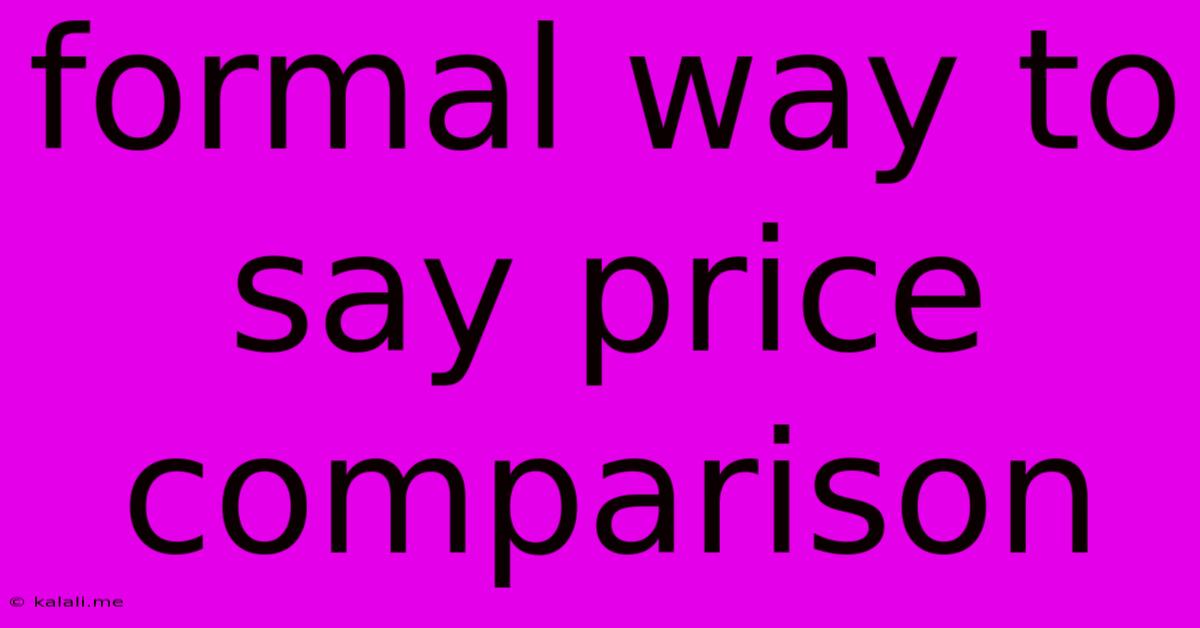Formal Way To Say Price Comparison
Kalali
May 30, 2025 · 2 min read

Table of Contents
Navigating the Nuances of Price Comparison: A Formal Approach
Price comparison, while seemingly straightforward, requires a more nuanced vocabulary when used in formal settings like business reports, academic papers, or professional communications. This article explores sophisticated alternatives to the phrase "price comparison," providing you with the vocabulary to articulate the process of evaluating costs with precision and professionalism.
Why Avoid "Price Comparison"?
While perfectly acceptable in casual conversation, "price comparison" lacks the sophistication needed in formal contexts. It can sound simplistic and may not accurately reflect the complexity of the analysis being undertaken. Choosing more refined terminology demonstrates a higher level of expertise and professionalism.
Elegant Alternatives for Formal Writing:
Here are several formal alternatives to "price comparison," categorized for clarity:
Highlighting the Analytical Aspect:
- Comparative Cost Analysis: This term emphasizes the analytical nature of the process, suggesting a thorough examination of costs. It's ideal when you've conducted a detailed study comparing prices.
- Competitive Pricing Evaluation: This option is suitable when your analysis focuses on the prices offered by competitors within a specific market.
- Cost Benchmarking: This sophisticated term implies comparing prices against industry standards or best practices. It suggests a more strategic approach to price analysis.
- Price Benchmarking: Similar to cost benchmarking, this emphasizes the comparison of prices themselves against a defined standard.
- Expenditure Assessment: This is a suitable term when the focus is broader than just direct pricing, encompassing associated costs and expenses.
Emphasizing the Outcome:
- Identification of Optimal Pricing Strategies: This focuses on the goal of the comparison – finding the best pricing approach.
- Determination of Cost-Effectiveness: This highlights the focus on value for money and efficiency.
- Market Price Research: This term suggests a broader analysis involving studying various market prices to understand trends.
- Price Optimization Analysis: This is an appropriate term when your comparison aims to find the most effective pricing strategy for maximizing profitability or efficiency.
More Concise Options:
- Cost Analysis: This is a shorter and more general term that can be suitable depending on the context.
- Price Evaluation: This is a simple yet formal alternative.
Choosing the Right Term:
The best alternative to "price comparison" depends heavily on the specific context. Consider the following factors when selecting your terminology:
- The scope of your analysis: Was it a simple comparison of two prices, or a comprehensive study involving multiple factors?
- Your audience: Are you writing for academics, business professionals, or a general audience?
- The purpose of your analysis: Were you aiming to identify the cheapest option, understand market trends, or optimize pricing strategies?
By incorporating these more formal and precise terms, you'll elevate the professionalism and sophistication of your writing while accurately conveying the nature of your price analysis. Remember to always tailor your language to the specific context and intended audience for maximum impact.
Latest Posts
Latest Posts
-
Difference Between Equilibrium And Steady State
May 31, 2025
-
How Many Oz Of Rice In A Cup
May 31, 2025
-
Is It Illegal To Provoke Someone
May 31, 2025
-
What Are Weapons Called In Soul Eater
May 31, 2025
-
How To Turn On Lights In Fallout 4
May 31, 2025
Related Post
Thank you for visiting our website which covers about Formal Way To Say Price Comparison . We hope the information provided has been useful to you. Feel free to contact us if you have any questions or need further assistance. See you next time and don't miss to bookmark.